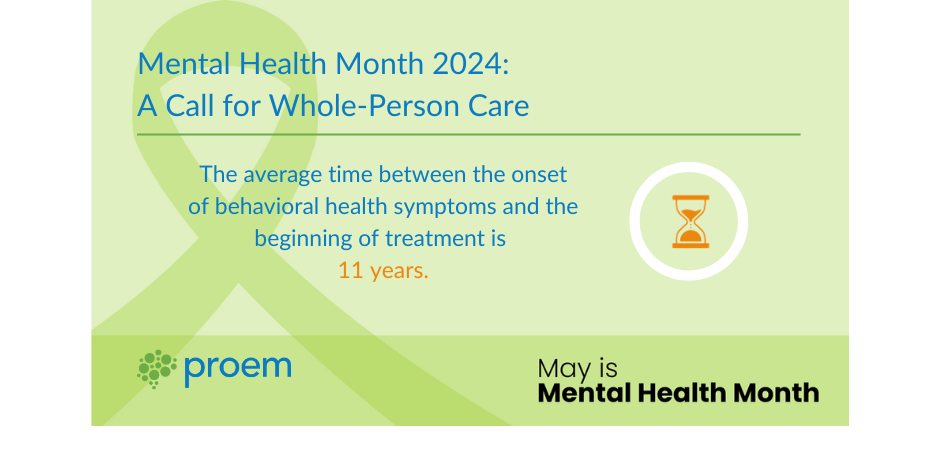
As we conclude Mental Health Month 2024, Proem is calling for all health care providers to provide whole-person care that integrates behavioral health with physical health. Why? Mental health care is health care. It takes far too long — up to 11 years — for people to receive treatment for their mental health disorders. This timeline can be drastically shortened if all health care providers take the time to screen their patients and use available digital mental health assessment tools to proactively address mental health concerns before a crisis.
Understanding the Whole Person Approach to Care
The whole-person approach in health care recognizes individuals as more than just their physical symptoms or conditions. It also considers mental, emotional and social well-being. By taking the time to better understand the whole person, providers can deliver more comprehensive and holistic care that better addresses and supports all aspects of an individual's health.
This care approach acknowledges that mental health plays a significant role in an individual's physical health, and thus their overall well-being. It emphasizes the importance of integrating behavioral health into physical health care to better ensure patients receive the care they need to live healthier, happier lives.
In addition, by understanding the whole person, providers can improve how they address the underlying causes of physical health issues. They can better identify and treat mental health conditions that may be contributing to or exacerbating physical symptoms and issues. This approach can translate to more effective and personalized treatment plans.
Read the eBook - Behavioral Health Integration in Primary Care: The Value & Revenue Opportunities.
Benefits of Integrating Behavioral Health into Physical Health Care
Integrating behavioral health into physical health care offers numerous potential benefits for patients and health care providers, including the following:
- Improved outcomes. By addressing physical and mental health needs, integrated care can help improve outcomes. Care integration supports a more comprehensive understanding of patients' health issues. It also improves targeted interventions that can help address root causes of conditions.
- Enhanced patient experience. Patients who receive integrated care often express higher levels of satisfaction with their holistic health care experience because their mental health is treated with equal importance as their physical health. An integrated approach can also help reduce the stigma that is common with mental health issues and encourage patients to be more open and transparent about their mental health concerns, challenges and questions.
- Increased care delivery efficiency. Integrating behavioral health into physical health care can increase the overall efficiency of care delivery. Integration enables patients to receive all the care they need in a single setting, so it has the potential to reduce fragmentation and duplication of services. A streamlined approach to care can also translate to cost savings and improved resource utilization for providers at a time when both are sorely needed.
- Expanded revenue opportunities. By offering integrated care, providers can tap into new revenue streams and further strengthen the bottom line. Behavioral health services can often be billed separately, delivering additional practice revenue. The financial incentive associated with integrating care should serve to encourage providers to embrace behavioral health integration and the whole-person approach to care.
Challenges With Implementing Integrated Whole-Person Care
While the whole-person approach in health care is associated with many benefits, it also brings its own set of challenges. Common challenges providers may face when implementing a whole-person integrated care approach include the following
- Limited resources. Integrating behavioral health into physical health care requires the allocation of additional resources. These can include the addition of new staff, training infrastructure and technology. Some providers may struggle to allocate the resources necessary to effectively support the integrated approach.
- Fragmented health care system. The current health care system is largely fragmented, with separate providers and systems for physical and behavioral health. Siloed care can make overcoming this fragmentation and establishing effective communication and coordination between providers difficult.
- Stigma and cultural barriers. Stigma surrounding mental health issues can prevent or raise significant barriers to a successful implementation of a whole-person approach to care. Individuals may be reluctant to seek behavioral health services because they fear judgment or discrimination. Cultural beliefs and attitudes concerning mental health can also impact whether someone embraces and is willing to use integrated care.
- Resistance to change. Implementing a whole-person approach may require a shift in one's mindset and practice. Providers may resist change or lack the necessary training, skills and experience to effectively and efficiently integrate behavioral health into their practice.
Strategies for Implementing a Behavioral Health Integration Model
Implementing a Behavioral Health Integration (BHI) model requires careful planning and execution. When you decide to pursue this implementation, the following are a few strategies to consider:
- Leadership support. Strong organization leadership support for implementation is crucial if the efforts are to prove successful. Leaders should champion the integrated behavioral health approach and BHI model. They should also provide any necessary resources and guidance that will help achieve integration.
- Training and education. Providers should receive training and education on integrated care. Areas to be covered would typically include understanding the connection between mental and physical health, developing the communication and collaboration skills needed to better support integrated care, and learning about evidence-based practices for BHI.
- Care coordination. Effective care coordination is required to achieve a seamless integration of behavioral health into physical health care. Providers should take the time to establish clear communication channels and referral pathways. These will help ensure patients receive the appropriate care from their physical and behavioral health providers.
- Patient engagement and empowerment. Engaging patients in their own care is a cornerstone of successful integration. Patients should be empowered to be active participants in decision-making and setting goals for their care. These can be achieved through a combination of patient education, shared decision-making tools, and ongoing follow-up.
- Data sharing and technology integration. To facilitate integration of behavioral health into physical health care, providers will want to lean on technology. Platforms, like the one offered by Proem Behavioral Health, electronically collect behavioral health data from patients throughout the care process and often before their appointments. Integration with an electronic health record (EHR) system then makes the data more easily accessible to providers. This strengthens communication and coordination while helping ensure all relevant information is available and shared in a timely manner.
- Collaboration and partnerships. Collaboration between different providers and community organizations is key to achieving successful integration. By building partnerships with mental health providers, social service agencies, and community-based organizations, among others, providers can grow the number of services they can offer and discuss with patients, all while further promoting a holistic approach to care.
The Future of Integrated Behavioral Health Care
Health care is steadily moving toward a whole-person approach to care. As the importance of mental health becomes better recognized and understood, more patients are reaching out to their trusted physical health providers in the hope of receiving support for their mental health needs. As this desire and need for integrated care increases, providers will want to develop a more efficient and cost-effective way to care for their patients. The good news is that technology can and will help.





.png)






